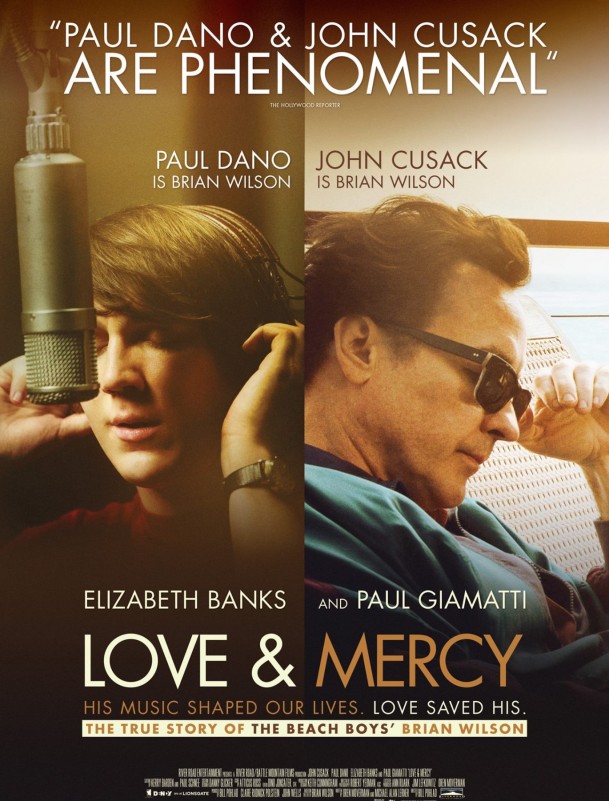
Love & Mercy, the biopic about Brian Wilson’s time making an all time great album Pet Sounds and later in his life when he is under the control of a maniac psychiatrist and he first begins dating his eventual wife, isn’t just a break from the summer blockbuster calendar but also from the tired conventions of biopics of music stars. Sure films like Walk the Line and Ray are exceptional, but that almost exclusively is because of the individual performance of the star rather than the overall quality of the film. Love & Mercy is as a radical change to the music biopic genre as Pet Sounds was to pop music. Director Bill Pohlad channels Wilson’s aesthetic and worldview subtly to create an interesting and challenging story that will enrapture not just Beach Boy fans but anyone who likes to see something new in cinema. These sort of films had been reduced to a simplistic formula: early years, success, dark internal struggles, and finally redemption. In part Love & Mercy is able to turn this formula on its head by its daring choice to have two very different actors play Wilson at different stages of his life. Paul Dano plays the young Wilson in the 60s and John Cusack plays him in the early 90s. Another music film that did this to equal effect was I’m Not There, where six actors played a different facet of Bob Dylan. The story here only focuses on small chunks of Wilson’s life instead of doing a birth to present day scenario. Other biopics have done this well lately; see Lincoln and Selma. The success of looking at a magnified specific portion of a legends life worked well in political dramas and luckily transitions well into the music biographical drama film too.
![]()
Another very creative avenue this film goes down is having the later years portion of the film (which is intercut with the early years, this is not a linear film at all) be told through the perspective of his girlfriend played by Elizabeth Banks. She basically is charged with rescuing him from controlling psychiatrists and friends who have misdiagnosed him for their own gain and doped him up on anti-psychotics to the point where he’s not recognizable to his friends or family. Her performance easily matches the timid and bipolar Wilson that Cusack gives us and she’s a huge part of why this film is so damn good. Another aspect that makes the film interesting is that it has three villains that get in Wilson’s way creatively and developmentally; his abusive and controlling father, his bandmate that undercuts what he wants to do on Pet Sounds and follow up albums, and his psychiatrist who prevents his family and friends access to him and keeps him in a stupor for his own personal financial gain. These are all different sides of the same coin. And that Wilson was essentially arrested in childhood development while only being able to create amazing new music is at the forefront. When Elizabeth Banks’ character comes in to his life and gives credence to his own choices and desires he doesn’t know how to act. He is only in control when he’s arranging music or writing lyrics that connect to him personally. To see him being able to start to have a life outside that with someone who cares for him is the movies triumph in its final moments.

Of course a music biopic has to have great music, and it does. Oftentimes the film doesn’t focus on entire tracks, but instead on small elements that Wilson strived so hard to create that would only be fleeting moments in the song. His perfectionism and drive to make something fresh (and by his own admission outdo The Beatles creatively) lead to someone who at times cares only about that. To then see him defeated later in life and unable to make the music he loves is rather devastating. Genius is often tortured, and in some ways only someone crazy could make something as good as Pet Sounds, but still its difficult to see. One of the most touching moments in the film is when Cusack sits down at a piano with Banks at his side after a fun date and he plays a quick tune. He says he thought of it when he first saw her and that he wouldn’t make a song out of it, the tune was just for that moment and then it’s floating off into the ether. It shows that he could break out of his psychosis in the right conditions, those created by someone who fosters his creativity.

The emotional aspects of the film, ranging from depression to anger, joy and raw humanity are mirrored beautifully with sparkling visual and aural treats. Pohlad knows what he’s doing when staging the scene to mirror across the two time periods portrayed and sharp and innovative, yet accessible, editing and cinematography. The film unnerves and thrills while having a limited scope it sharpens the narrative and gives a sense of who Wilson is, not the full painted picture but the key brushstrokes of his essence. To be able to capture the artistic process like this is incredible. It reminds me of a film like Fellini’s 8 1/2 in that it’s so personal but still so visually and narratively striking. This film has good vibrations indeed.
